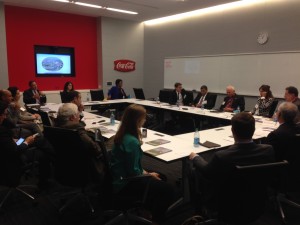Updated
US Companies See Opportunities in Morocco’s Agricultural Sector – Jean R. AbiNader
Atlanta Forum Provides Key Contacts
Jean R. AbiNader, MATIC
October 21, 2015
One can’t help but be skeptical when hearing about another business conference extolling the promise of opportunities abroad. It is not uncommon to ask “So what?” when looking for results that justify the expense of attending events while coming away with glossy brochures, a fistful of business cards, and tenuous promises of quick responses.
So we did something different at the US-Morocco Trade & Investment Forum in Atlanta on October 13. Most of the time was allocated for companies to talk with presenters, other companies, and government officials, with an emphasis on building face-to-face relationships so essential to doing business.
Well, how did that turn out? I can only give you my perspective and reflect on emails I received following the Forum, but I think they made the right decision – put people with mutual interests in a room and let them talk business. It worked out fine. I moderated a panel on agriculture, agri-business, and water management. Not unimportant to a country like Morocco where upwards of 40% of the workforce is in the farming sector and, in a good year, the sector contributes more than 18% to the country’s GDP.
 In the room were representatives of Coca-Cola bottlers and distributors in Morocco, whose business affects some 70,000 Moroccan employees and their families. Given that Coca-Cola sources as much as it can locally, they are major players in the sector and in the economy. More importantly, Coke provides a great deal of technical assistance to local businesses to grow supply chain products and services, building the next generation of entrepreneurs.
In the room were representatives of Coca-Cola bottlers and distributors in Morocco, whose business affects some 70,000 Moroccan employees and their families. Given that Coca-Cola sources as much as it can locally, they are major players in the sector and in the economy. More importantly, Coke provides a great deal of technical assistance to local businesses to grow supply chain products and services, building the next generation of entrepreneurs.
From the Moroccan government, we heard from three very competent representatives: Mrs. Asma El Kasmi from the National Office of Electricity and Potable Water (ONEE), Abdeslam Ziyad, who directs strategic planning at the Ministry of Agriculture, and Soufiane Larguet, Director for Strategies and Statistics at the Ministry. All presented current data and projected opportunities in their areas of specialty.
The US and Moroccan private sectors included private equity investment firms, a foundation and company specializing in agriculture and water projects in Africa, a leading producer of organic and specialty food and cosmetic oils, several agro-industry firms, and a working farm that provides overseas technical assistance in a broad range of areas including improving seed, water management technologies, and food security processes.
One of the highlights of the session was the opening remarks by Gary Black, Commissioner of the Georgia Department of Agriculture. His presentation on the industry in Georgia and his insights into potential bilateral links has already led to discussions with Moroccan Ambassador Rachad Bouhlal on an exchange program between food security experts in Morocco and Georgia. Commissioner Black’s rational is that a thorough understanding of the food security (read FDA and USDA in the US) guidelines in the marketplace facilitates trade. This was borne out by several participants who spoke about the difficulty of navigating food and argan and olive oil exports to the US, despite the US-Morocco Free Trade Agreement.
A positive follow up is that several of the US participants in the room have already begun to the in touch with counterparts in the government and private sector in Morocco. And Moroccan companies are clearly interested in pursuing relationships that ease the process of exporting into the US. It is a beginning of an important exchange of ideas, proposals, and discussions about concrete business and investment opportunities that will continue for some time.
